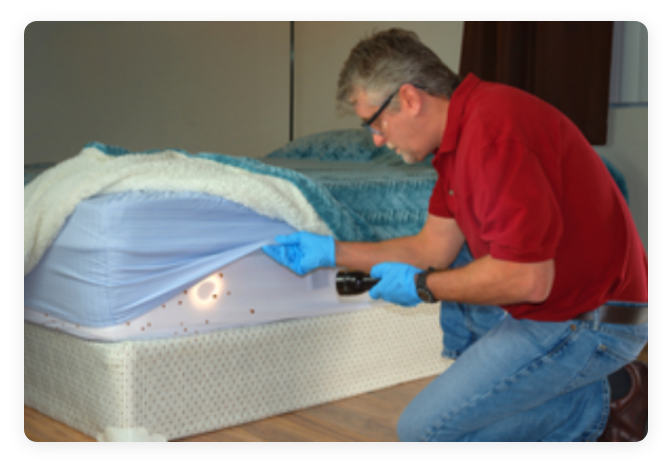Bed bugs can be a nightmare to deal with. These tiny creatures hide in the cracks and crevices of your home and can cause sleepless nights and itchy bites. If you have experienced a bed bug infestation, you know how frustrating it can be to get rid of them.
Fortunately, there are many bed bug repellents and sprays on the market that can help keep these pests at bay.
In this blog post, we will discuss some general bed bug repellent and sprays available for you.

Is There Any Repellent or Spray that Really Kills Bed Bugs?
Before we discuss whether bed bug sprays are effective or not, it’s important to understand how they work. Bed bugs breathe through tiny openings called spiracles, and most sprays work by attacking these openings and suffocating the insects.
Some sprays also contain ingredients that interfere with the bugs’ nervous system, causing paralysis and death. Some common active ingredients in bed bug sprays are pyrethroids, neonicotinoids, and insect growth regulators (IGRs).
Are Bed Bug Sprays Effective?
The short answer is yes, bed bug sprays can be effective in killing bed bugs. However, the effectiveness of the spray depends on several factors, such as the type of spray, the severity of the infestation, and how well you follow the instructions. Some sprays can kill bed bugs on contact, while others require them to crawl over treated surfaces to be effective.
Additionally, the effectiveness of bed bug sprays also varies depending on active ingredients, and concentration level. Studies have shown that some sprays contain chemicals that bed bugs are becoming resistant to. Therefore, it is crucial to select a product that is proven to be effective. When purchasing a bed bug spray, read the label carefully to ensure it is safe for indoor use.
Follow Instructions Carefully
Once you have chosen a bed bug spray, it is important to follow the instructions carefully. Bed bug sprays can be toxic, so it is important to use them in a well-ventilated area and to wear protective clothing and gloves.
Make sure to shake the canister well before using, and hold it at a distance of 8 to 10 inches from the surface you are spraying. Spray all surfaces that may be infested, including mattresses, box springs, and bed frames. Make sure to use the spray in cracks and crevices, where bed bugs may be hiding.
Which Spray or Repellent Is Best for Bed Bugs?
There are many different types of bed bug repellents and sprays on the market, so it can be challenging to know which one to choose. When selecting a bed bug repellent, there are a few key factors to consider.
First, you want to look for a product that is effective against bed bugs. You also want to choose one that is safe for use around humans and pets and one that is easy to use. Be sure to read the label carefully before purchasing a bed bug repellent to ensure that it meets all of your needs.
Essential Oil Spray
Essential oils like lavender, peppermint, and tea tree oil have been known to repel bed bugs. They work by overwhelming the bed bugs’ sense of smell, making it difficult for them to detect human hosts.
To make a DIY essential oil spray, mix 20 drops of your preferred essential oil with water in a spray bottle, shake well, and spray all bed frames, mattresses, and beddings thoroughly.
Alcohol Solutions
Another effective way to prevent bed bugs is by using alcohol-based sprays. Alcohol is a natural insecticide that kills bed bugs on contact.
To make an alcohol solution, mix rubbing alcohol with water in a 1:1 ratio and pour it into a spray bottle. Spray the solution along bed frames, headboards, and beddings.
Diatomaceous Earth
Diatomaceous earth is a natural substance made from fossilized diatoms that have sharp edges that can cut through bed bug’s outer shells.
To use it as a bed bug preventive measure, sprinkle a generous amount of the powder around bed frames, under the mattress, and around the baseboards.
The substance is safe but can be harmful if inhaled. So make sure to wear a mask and eye protective gear while applying.
Pyrethroid Sprays
Pyrethroid sprays are synthetic insecticides that kill bed bugs on contact. They are designed to treat bed bug infestations and should be used with caution.
When using pyrethroid sprays, make sure to read and follow the label instructions carefully and avoid applying it on beddings and upholstery.
Read our New Blog: What Is the Main Cause of Bed Bugs?
Preventing and Controlling Bed Bug Infestations
While bed bug sprays can be effective in eliminating bed bugs, prevention is key. Regularly inspect your home for signs of bed bugs such as bloodstains, fecal matter, and shed skins. Be sure to vacuum your carpets, furniture, and bedding regularly.
If you suspect an infestation, immediately take action by calling a professional exterminator. It is also essential to check for bed bugs when traveling and to avoid purchasing used furniture.
Professional Bed Bug Treatments
If you have a severe bed bug infestation, it’s best to seek professional help. Professionals use heat treatment, chemical treatments, and other methods to eradicate bed bugs.
Conclusion
Bed bug repellents and sprays are an effective method in the fight to keep your home clean and free of these unwelcome pests. Whether you choose to use natural, homemade methods like rubbing alcohol or commercial treatments available at most stores, there are many options that can help repel and eradicate bed bugs.
But, if bed bugs become an issue that’s too large for you to handle on your own, call Unitech Pest at the first sign of trouble. We guarantee to be on site to assess the situation within 24 hours.
With expert experience in the pest control industry, Unitech Pest will ensure your home is defended against any infestation. So don’t wait another day, protect yourself today with Unitech Pest!


